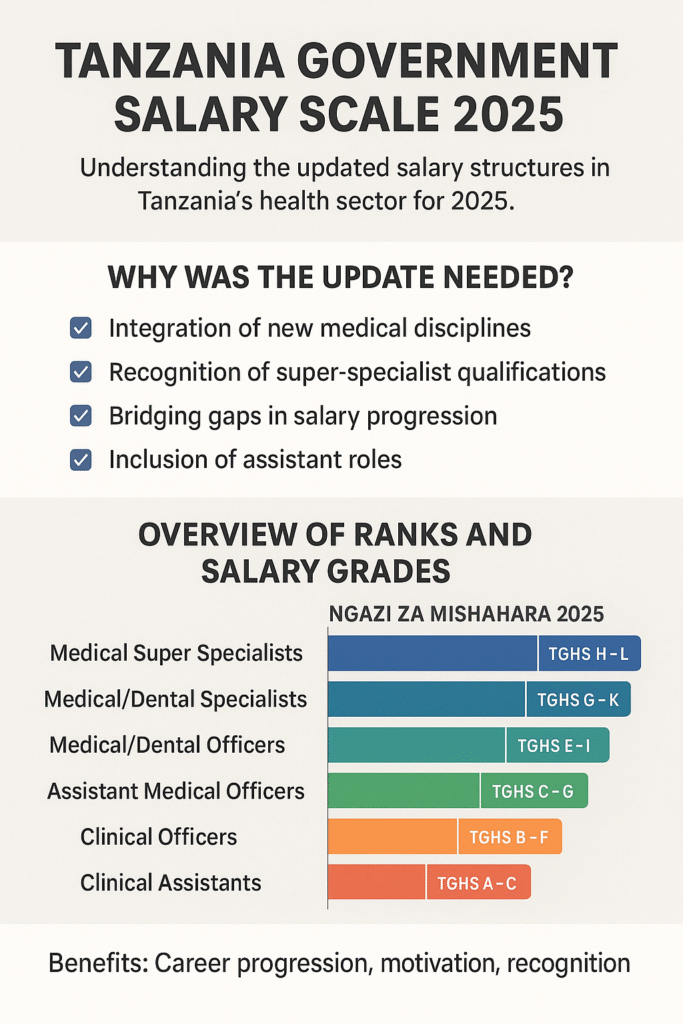Understanding the Tanzania government salary scale 2025 is essential for professionals in public service, especially those in the health sector. Following a major restructuring spearheaded by the Ministry of Health in 2023 and implemented in 2025, the government introduced a modernized and transparent salary structure aimed at attracting and retaining skilled professionals while aligning pay with career progression and qualifications.
This article breaks down the latest salary scales, job ranks, and cadre classifications introduced in the Tanzanian civil service, with a focus on health workers. Whether you’re a job seeker, a public servant, or a policy analyst, this guide will help you navigate the updated pay grades and understand what they mean for your career.

Why the Salary Update Was Introduced
The overhaul of the government pay system came as a response to several pressing needs:
- Rapid changes in medical science and health delivery
- Emergence of specialized disciplines requiring advanced qualifications
- Bridging salary inconsistencies across different ranks and regions
- Motivating skilled professionals to serve in underserved areas
The Ministry of Health led this change to reflect global healthcare workforce standards and respond to evolving public health challenges.
Key Highlights of the Tanzania Government Salary Scale 2025
The updated scale includes new job titles and clear progression paths from assistant roles to specialist and super-specialist positions. The salary grading system now follows the TGHS (Tanzania Government Health Scale) and TGHOS (Tanzania Government Health Operational Scale) designations.
Short Summary Table of Common Health Cadres and Pay Grades
| Cadre | Pay Grade |
|---|---|
| Medical Super Specialists | TGHS H – L |
| Medical Officers / Dentists | TGHS E – I |
| Clinical Officers | TGHS B – F |
| Nursing Officers | TGHS D – H |
| Enrolled Nurses | TGHS B – F |
| Pharmacists | TGHS D – H |
| Radiographers | TGHS B – F |
| Medical Attendants | TGHOS A – C |
This simplified table offers a snapshot of the new rank structure. A more detailed guide is available in the Ministry’s official circular, and in the PDF attached in this article
Also check the expected pay raises calculation after the announcement of 35.1% increment of salary May Mosi
Career Progression in the Public Health Sector
The Tanzania government salary scale 2025 introduces structured career ladders, allowing employees to grow through academic achievements, years of service, and job performance. For example:
- A Clinical Officer starting at TGHS B can progress to TGHS F upon further training and years of service.
- Nursing professionals can move from Assistant Nursing Officer to Nursing Officer and eventually to Nursing Specialist with relevant postgraduate training.
Each promotion or upgrade in rank comes with corresponding financial incentives and additional responsibilities.
New Cadres Introduced
As part of modernization efforts, several new roles were added to the government workforce:
- Speech and Language Therapists
- Audiologists and Assistants
- Mental Health Rehabilitation Officers
- Medical Equipment Engineers
- Nutrition Specialists
These additions reflect the government’s focus on specialized and community-centered care.
Salary Increase Highlights: Case Study for Super Specialists
A significant highlight of the 2025 reforms is the salary increase for Medical Super Specialists. This dramatic adjustment reflects the government’s prioritization of advanced, fellowship-trained professionals critical to delivering high-level medical care in referral hospitals.
This increase aims to reduce brain drain and attract Tanzanian specialists working abroad to return and serve locally.
Teachers and the Broader Civil Service
While the focus of this article is on the health sector, teachers and other civil servants are also impacted by the 2025 reforms. A similar structure—known as “Viwango vya mishahara vya walimu 2025”—is being rolled out across the education sector.
Highly qualified teachers, especially those with master’s degrees and specialized certifications, will benefit from comparable salary adjustments and promotion frameworks. This is part of a broader policy to retain skilled professionals in the public education system.
Key Benefits of the New Tanzania Government Salary Scale 2025
The updated salary structure brings multiple benefits to the Tanzanian public service landscape:
1. Transparency and Standardization
Employees can now clearly understand their earning potential and the criteria for promotion. This enhances motivation and accountability.
2. Retention of Skilled Workers
Increased salaries, especially in critical sectors like health and education, help retain professionals in the public sector and reduce migration to private or foreign employers.
3. Focus on Underserved Areas
New assistant roles and mid-level professionals are expected to improve service delivery in rural and peri-urban areas.
4. Educational Incentives
Further education can earn public servants up to two additional salary steps, making continuous professional development more rewarding.
Tanzania government salary scale pdf
Download the Tanzania government salary scale pdf below to view all the salary scales and ranks for public employees
Final Thoughts
The Tanzania government salary scale 2025 represents a major step forward in professionalizing the public service, improving transparency, and retaining skilled workers in critical sectors. By clearly defining salary ranges, qualifications, and career trajectories, the government is investing in the long-term efficiency and quality of public service delivery.
Whether you are an existing government worker or planning to apply for a role in the civil service, understanding the new structure gives you a strategic advantage in managing your career.
Stay informed, plan your professional growth, and take advantage of the opportunities offered by this well-structured and forward-looking salary system.
FAQs: Tanzania Government Salary Scale 2025
Q1: Are all government workers affected by this change?
Yes. Although the health sector is prioritized, similar frameworks are being rolled out across education, engineering, and administrative services.
Q2: How do I check my new salary grade?
The Ministry of Health and other sector-specific ministries publish updated salary guides. You can also inquire with your HR department.
Q3: Do these grades apply to parastatal workers?
Not directly. Parastatals often have their own salary structures, although some principles may align with the civil service scheme.






